Education is the cornerstone of personal growth and empowerment. For disabled students, access to quality education is not just about academic learning but also about ensuring inclusivity, independence, and equality. However, navigating the world of education can sometimes feel challenging for students with disabilities and their families. This article aims to explore the various accessible education options, the resources available, and how to make education more inclusive and supportive for every student.
Understanding the Importance of Accessible Education
Accessible education goes beyond ramps and elevators. It is about creating an environment where every student can participate, learn, and thrive regardless of their physical or cognitive abilities. Education is a fundamental right, and inclusivity ensures that disabled students are not left behind.
Accessibility as an Opportunity for Innovation
One of the key benefits of promoting accessible education is the opportunity it provides for businesses to innovate. Designing tools, technologies, or infrastructure for inclusivity encourages creativity and a problem-solving mindset.
For instance, businesses in the tech sector can collaborate with educators and organizations like Robobionics to develop adaptive learning platforms that cater to a wide range of needs.
These innovations don’t just serve disabled students—they often lead to products and services that benefit all users. Voice recognition technology, for example, was initially developed as an assistive tool but has become a mainstream convenience used by millions worldwide.
Businesses that invest in accessible education solutions position themselves as leaders in innovation while gaining access to new markets and customer bases.
Building Stronger Brand Equity Through Inclusive Initiatives
For businesses, supporting accessible education is a chance to build a reputation as a socially responsible and forward-thinking organization. Consumers and clients increasingly value brands that demonstrate a commitment to inclusivity and equality.
By aligning themselves with the cause of accessible education, businesses can enhance their brand image and foster loyalty among socially conscious audiences.
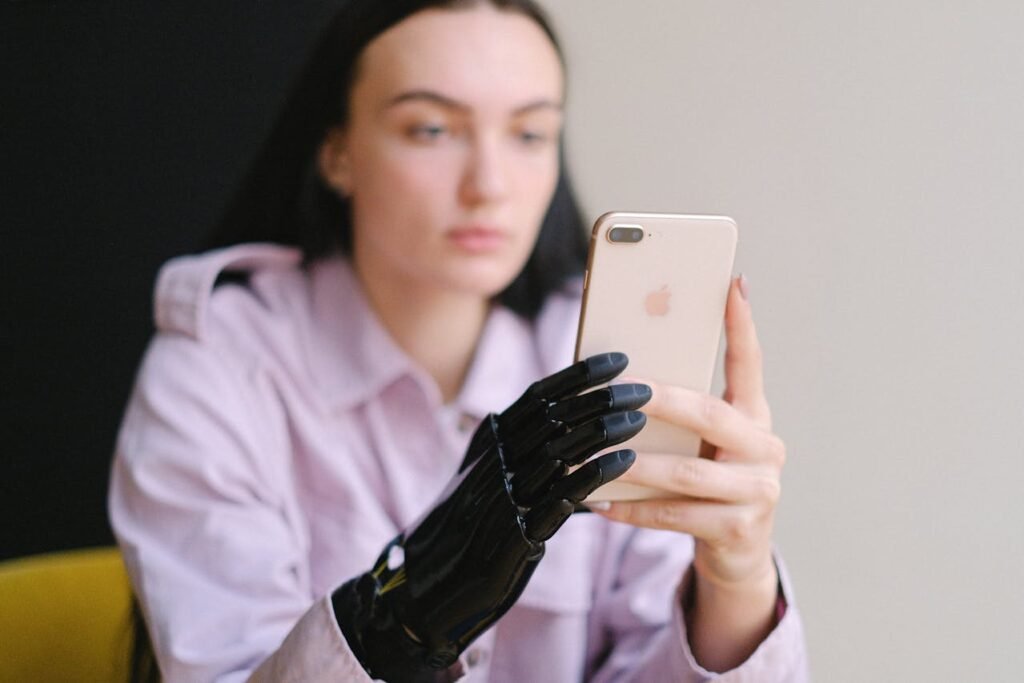
However, it’s important for businesses to approach these initiatives strategically. Token gestures or one-time donations may not yield the same impact as sustained, meaningful involvement. Partnering with schools, NGOs, or accessibility-focused organizations like Robobionics ensures that efforts are well-directed and make a tangible difference.
Creating a Pipeline of Future Talent
Accessible education helps businesses nurture a diverse pipeline of skilled professionals. By supporting initiatives that empower disabled students, companies contribute to a talent pool that reflects a broader spectrum of experiences and perspectives. This diversity is invaluable in today’s competitive, globalized economy, where innovation often arises from collaboration across varied viewpoints.
Businesses can go a step further by offering mentorship programs, internships, or scholarships for disabled students. Such initiatives provide real-world exposure, helping students transition smoothly from education to employment while giving companies access to untapped talent.
Challenges Faced by Disabled Students in Traditional Education
Before delving into the solutions, it’s essential to understand the challenges disabled students often encounter in traditional educational settings.
Overcoming the Lack of Inclusive Curriculum
Another significant challenge lies in the curriculum itself, which often does not consider diverse learning needs. Traditional teaching methods prioritize uniformity, making it difficult for disabled students to keep pace with their peers. This gap is particularly noticeable in STEM fields, where hands-on experiments and visually dense materials are common.
To address this, businesses can innovate in curriculum design. Partnering with educational institutions to co-create adaptive learning programs can ensure that teaching methods cater to a wider range of abilities.
For example, companies specializing in virtual reality (VR) can create simulations that allow students with mobility challenges to experience lab experiments in a virtual environment. These solutions not only benefit disabled students but also make education more engaging for all learners.
Addressing the Social Isolation Gap
Disabled students often experience social isolation in traditional schools due to limited peer understanding or inadequate teacher training. This isolation is a direct result of environments that fail to foster meaningful interactions between students with and without disabilities.
Businesses can contribute by sponsoring awareness programs and training sessions in schools to cultivate empathy and inclusion. Additionally, companies can support the development of platforms that connect disabled students with mentors or peers who can share their experiences and provide guidance.
By investing in such initiatives, businesses help create a culture of belonging and mutual respect, both in education and beyond.
Bridging the Technological Divide
Technology has the potential to be a great equalizer in education, but many disabled students still face barriers in accessing the tools they need. Whether it’s the cost of assistive devices or the lack of compatible software in schools, these technological gaps significantly impede learning opportunities.
Businesses, particularly those in the tech sector, can play a transformative role by developing affordable assistive devices and ensuring their compatibility with existing educational platforms. For example, Robobionics’ innovative prosthetics like Grippy™ enable users to perform tasks that were previously challenging, demonstrating how tailored technology can empower individuals.
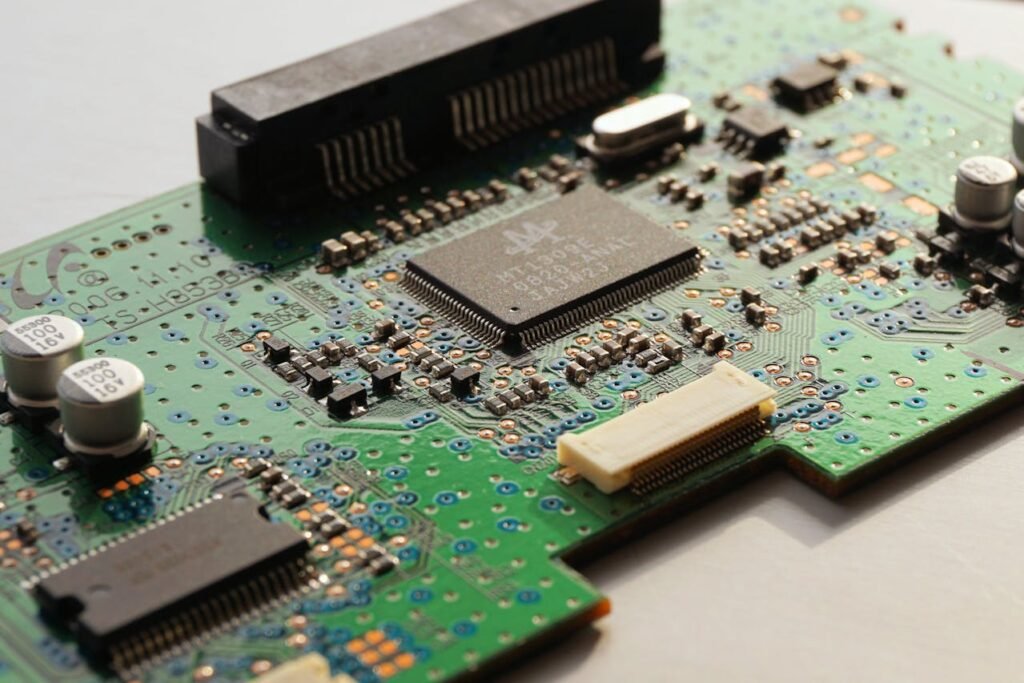
Innovative Solutions for Accessible Education
The good news is that educational institutions, NGOs, and tech innovators are working tirelessly to ensure education is more inclusive for disabled students. Below, we explore various options and strategies to make this vision a reality.
Inclusive Schools and Specialized Institutions
One of the first steps toward accessible education is identifying schools and colleges that prioritize inclusivity. These institutions design their infrastructure, teaching methods, and extracurricular activities to accommodate diverse needs. For example, schools that integrate sign language interpreters or Braille textbooks enable students with hearing or visual impairments to participate fully.
Specialized institutions also play a vital role by catering specifically to students with disabilities. These schools focus on personalized learning, ensuring students receive the attention and resources they need to succeed.
Leveraging Assistive Technology
Assistive technology has revolutionized education for disabled students. From screen readers for visually impaired students to communication boards for those with speech disabilities, technology bridges many gaps in learning. Devices like smart pens, speech-to-text software, and adaptive keyboards ensure that students can keep up with their peers.
At Robobionics, we are deeply inspired by how technology can transform lives. Just as our 3D-printed bionic hand, Grippy™, empowers users with greater independence, assistive tools in education foster self-reliance among students.
The Role of Government Policies and Legal Frameworks
Government policies play a crucial role in ensuring accessible education for disabled students. In India, laws like the Right of Persons with Disabilities Act, 2016 mandate inclusive education and provide guidelines for institutions to follow. Schools are required to have accessible infrastructure, inclusive teaching practices, and accommodations such as extra time for exams.
Similarly, initiatives like the Samagra Shiksha Abhiyan promote equity in education by funding projects aimed at creating a barrier-free environment for all students. Parents and educators must familiarize themselves with these policies to ensure their children or students receive the benefits they deserve.
Home-Based Learning as a Flexible Option
For some students, traditional schooling may not be the most effective option due to health concerns, mobility challenges, or other reasons. Home-based learning can be an excellent alternative. With advancements in online education, students can now access high-quality courses, live classes, and interactive assignments from the comfort of their homes.
Platforms like Coursera, Khan Academy, and BYJU’S offer a range of courses tailored to different age groups and abilities. Parents can supplement these resources with assistive tools to ensure the learning experience remains inclusive.
Additionally, home-based learning allows for a personalized pace, giving students the freedom to focus on their strengths and gradually overcome challenges.

Gamified Rehabilitation: Bridging Education and Adaptation
At Robobionics, we understand that adaptability is a journey. Our gamified rehabilitation programs are designed to make the process engaging and rewarding, not just for prosthetic users but for disabled students as well.
Learning through gamified platforms can improve focus, motor skills, and cognitive development, making it easier for students to transition into formal education or advanced learning.
Training Educators for Inclusive Practices
An inclusive education system cannot thrive without properly trained educators. Teachers play a pivotal role in creating a supportive learning environment, but many lack the necessary skills to address the needs of disabled students effectively.
Workshops, certification programs, and hands-on training in inclusive teaching strategies can empower educators to make classrooms more accessible. This includes learning to use assistive technology, developing alternative teaching methods, and fostering an empathetic classroom culture.
Parents and communities can advocate for such training programs by engaging with school boards and educational policymakers.
Building a Supportive Ecosystem
A truly inclusive education system requires collaboration. Beyond schools and teachers, the support of parents, peers, and communities is essential. Let’s explore how different stakeholders can contribute to making education accessible.
Parental Involvement
Parents are often the first advocates for their children. They can play a proactive role by:
- Choosing inclusive schools or alternative learning methods.
- Collaborating with teachers to develop individualized education plans (IEPs).
- Exploring assistive tools and resources that suit their child’s specific needs.
Parental encouragement can significantly boost a child’s confidence, motivating them to participate actively in their education.
Peer Support and Awareness
Students who grow up in an inclusive environment often develop a natural sense of empathy and collaboration. Schools can foster this by organizing awareness programs, buddy systems, and peer mentoring initiatives.
When peers support one another, it reduces the stigma associated with disabilities, creating a more cohesive and harmonious learning environment.
Community Engagement
Communities have the power to transform educational landscapes by funding accessible infrastructure, organizing workshops, and raising awareness about inclusive education. NGOs and local organizations can also step in to provide scholarships, assistive devices, and vocational training for disabled students.
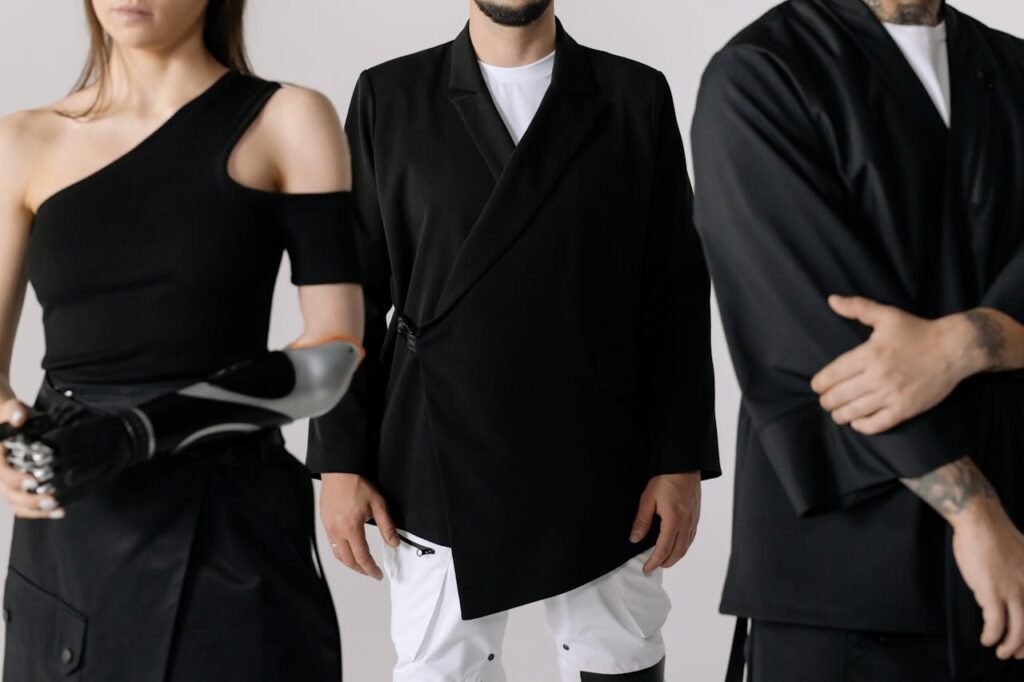
Inclusive Higher Education: Opportunities Beyond School
While significant progress has been made in primary and secondary education, the transition to higher education often presents additional challenges for disabled students. Universities and colleges must create environments that prioritize accessibility, from physical infrastructure to academic resources.
Institutions like Delhi University and IITs have initiated programs to support disabled students, such as providing accessible accommodations, mentorship programs, and scholarships. However, much work remains to be done to ensure every student feels welcome and supported.
Students considering higher education should research universities that emphasize inclusivity, offering resources like disability support centers and assistive technology labs. Building a network of mentors and peers can also provide the guidance and encouragement needed to navigate this new phase.
Vocational Training and Skill Development
For students with disabilities, vocational training can be a practical pathway to independence and career success. Skill-based programs focus on teaching hands-on abilities that are directly applicable in the workforce. This can include training in IT, crafts, design, or even advanced fields like robotics and AI.
Many organizations in India, such as Skill India and Enable India, offer vocational programs tailored to the needs of disabled individuals. These programs not only equip students with practical skills but also boost their confidence and employability.
Breaking Barriers Through Awareness
Awareness campaigns are vital for dismantling the stereotypes and prejudices often faced by disabled students. Schools, colleges, and workplaces should organize workshops and discussions that educate people about the importance of inclusivity.
Parents and educators can also advocate for changes at the policy level by highlighting the success stories of disabled students who overcame challenges to achieve greatness. Sharing such stories inspires others and fosters a culture of acceptance and celebration of diversity.
Looking to the Future: A World of Equal Opportunities
Accessible education is not just a goal—it’s a necessity. By ensuring that every child, regardless of ability, has access to learning, we can build a world that values diversity and inclusivity. Education is the foundation of independence, and when disabled students are given the right tools and support, they can achieve remarkable success.
Taking the First Step
Creating accessible education requires a collective effort. Schools, parents, educators, and policymakers must come together to identify barriers and implement practical solutions. Technology, awareness, and advocacy are powerful tools in this journey.
At Robobionics, we are proud to contribute to this mission by empowering individuals with innovative solutions like Grippy™ and supporting initiatives that restore dignity and independence. Accessible education is a cause close to our hearts, and we believe that every student deserves a chance to shine.
Empowering Educators with Resources
To create truly inclusive educational environments, teachers need access to the right tools and resources. This includes professional development programs, access to assistive technology, and collaboration with special educators. Schools should invest in ongoing training to help teachers understand the diverse needs of their students and adopt flexible teaching methods.
For example, Universal Design for Learning (UDL) principles encourage educators to create lesson plans that cater to various learning styles. This approach ensures that students with disabilities can engage with the material just as effectively as their peers.

Collaborative teaching models, where special educators work alongside mainstream teachers, can also enhance classroom inclusivity. Together, they can address individual challenges more effectively, ensuring that every student gets the attention and support they need.
The Impact of Inclusive Education on Society
Inclusive education doesn’t just benefit disabled students; it enriches society as a whole. By fostering understanding and empathy in classrooms, we create a generation of individuals who are better equipped to value diversity and contribute meaningfully to their communities.
Students who grow up in inclusive environments are more likely to become advocates for equity and inclusion in their personal and professional lives. This ripple effect helps dismantle societal barriers and creates opportunities for all.
Advocacy for Accessible Education
Advocacy is a powerful tool for driving change. Parents, educators, and students themselves can advocate for better policies, increased funding for assistive technology, and the implementation of inclusive practices in schools and universities.
Social media campaigns, petitions, and collaborations with disability rights organizations can amplify these voices. Sharing success stories of disabled students thriving in inclusive environments can also inspire others to take action.
For those interested in deeper involvement, community-based programs or joining advocacy groups like the National Centre for Promotion of Employment for Disabled People (NCPEDP) can provide valuable platforms for making a difference.
Bridging the Gap with Robobionics
At Robobionics, we understand the transformative power of education. Our mission extends beyond creating innovative prosthetics; we aim to empower individuals to lead fulfilling lives. Through our gamified rehabilitation programs and products like Grippy™, we are committed to helping individuals embrace independence and achieve their goals.
Empowering Education Through Innovation
Education becomes truly inclusive when tools and resources align seamlessly with the user’s needs. Our advanced prosthetics, such as Grippy™, are designed not only to restore functionality but also to inspire confidence in users, including students.
By offering lightweight and user-friendly designs, these solutions allow students with limb differences to engage in activities like writing, using digital devices, or participating in practical labs.
For businesses that develop educational tools or technologies, this serves as a blueprint: the best innovations are those that combine usability with empowerment. When designing solutions for disabled students, businesses should:
- Prioritize user-centric designs.
- Test accessibility features with real-world users to identify challenges.
- Partner with specialists like Robobionics to integrate assistive tools seamlessly.
Businesses in the education sector can also explore opportunities to co-develop technologies that align with their curriculum needs while incorporating adaptive devices like ours, creating a holistic ecosystem that supports every learner.
Supporting Gamified Learning Experiences
Gamification in education has proven to be a game-changer, especially for students with disabilities. At Robobionics, our gamified rehabilitation programs have shown how interactive learning methods improve adaptability and engagement. This approach is not limited to rehabilitation—it can extend to classrooms as well.
For instance, businesses in the EdTech sector can collaborate with Robobionics to integrate gamified exercises that enhance motor skills or teach STEM concepts in ways that are accessible for students using prosthetics. By designing games and interactive platforms that align with assistive technologies, businesses can open new doors for participation and inclusivity.
Building Partnerships That Drive Change
Businesses have the potential to lead change by supporting and amplifying the efforts of organizations like Robobionics. Partnerships can extend beyond financial contributions to include shared expertise, collaborative projects, and community outreach.
For instance, businesses can sponsor workshops that introduce educators to assistive technologies, ensuring these tools are effectively integrated into classrooms.
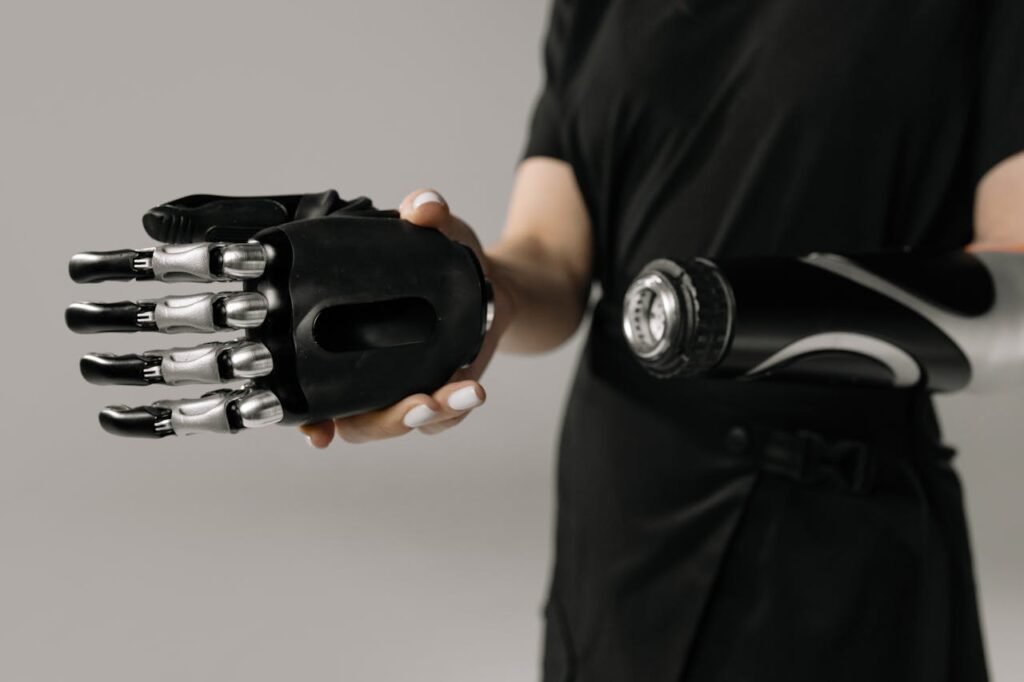
Additionally, businesses can work with Robobionics to develop corporate social responsibility (CSR) initiatives that focus on education accessibility. This might include creating scholarships for disabled students, funding accessible infrastructure projects, or organizing awareness campaigns in schools and colleges.
When businesses take an active role in supporting accessibility initiatives, they don’t just meet their social responsibilities—they become key drivers of innovation and inclusion, earning trust and loyalty from communities.
Innovating for the Future
As we look to the future, Robobionics envisions a world where education is not just accessible but empowering for everyone. Businesses can play a pivotal role in this vision by investing in research and development that prioritizes accessibility and inclusivity.
Collaborating with organizations like Robobionics offers businesses the opportunity to pioneer solutions that transform the educational landscape. Together, we can create technologies that not only meet the immediate needs of disabled students but also anticipate the challenges of tomorrow.
For businesses looking to make a lasting impact, the journey begins with a commitment to inclusivity and innovation. By supporting accessible education, they empower individuals, strengthen communities, and contribute to a brighter, more equitable future.
Conclusion
Accessible education is not just an initiative—it is a commitment to fairness, opportunity, and dignity for all. By removing barriers and fostering inclusivity, we empower disabled students to unlock their full potential. This journey requires the collective effort of families, educators, policymakers, and society at large, ensuring that no student is left behind.
Robobionics is proud to support this mission through innovation and advocacy. Just as we empower individuals with advanced prosthetics like Grippy™, we also believe in empowering students through access to education and independence. Together, we can create a future where every child, regardless of ability, has the chance to thrive.



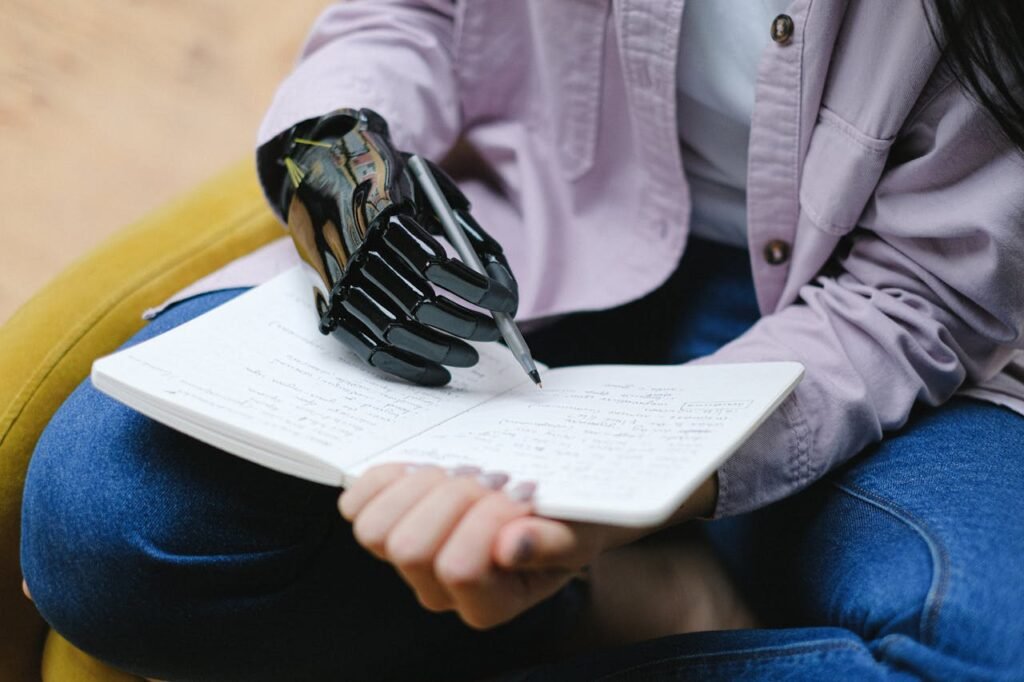
Pingback: How AI is Revolutionizing the Education Sector: A Deep Dive - Designbeep